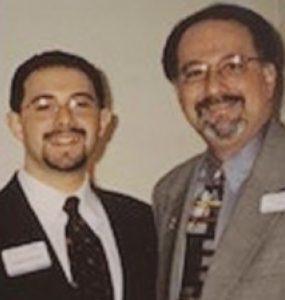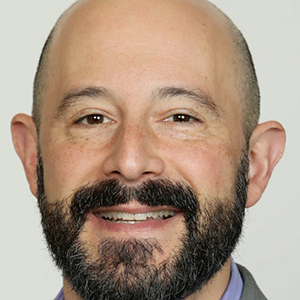
GUEST EDITOR – Jonathan Mariano
Moving from sales to learning needs a new focus
 As a child, my imagination and curiosity were insatiable. I would dress up as superheroes, donning my tights and a red cape, prepared to save the world.
As a child, my imagination and curiosity were insatiable. I would dress up as superheroes, donning my tights and a red cape, prepared to save the world.
Little did I know that my childhood love for superheroes and strong desire to help others would lead me on a remarkable journey, following in my father’s footsteps in pharmaceutical sales. This is the story of my journey from pharmaceutical sales to corporate training and the critical lessons I learned along the way.
Back then I didn’t know how the first 20 years of sales experience combined with a thirst for continuous learning would teach me the lessons I needed to learn. My hope is that the following four lessons will help those who are new to training learn how to thrive in this exciting and engaging vocation.
As you will see, it takes a blend of diligence, discipline and a quest for knowledge.
1. Selling Skills Aren’t the Same as Training Skills
At the ripe age of 7, I exchanged the superhero costume for a new one, a three-piece suit. I had the formative experience of accompanying my father, a 30-year veteran pharmaceutical representative, to visit his favorite customers.
I vividly remember the day he took me to meet my first doctor. As we walked into the office, I felt a nervous thrill coursing through me, eager to deliver the message my father taught me to repeat. Standing atop a stepstool, I gave my first sales presentation, visual aid in hand. In that moment, I realized that my passion was not necessarily in saving the world by fighting crime, but in communicating information to help others.
I knew what I wanted to be when I grew up: a pharmaceutical sales representative like my dad!
Fast-forward 20 years, and nearly 45,000 sales calls, I had a tough decision to make: Did I want to remain a career representative like my father, or explore the many other possible career options within life sciences? I felt my purpose calling, shaking me out of my comfort zone. Could I start all over again?
I knew I was taking a risk, but what great superhero doesn’t do that? I took the plunge and began the journey into training as an associate director of product training with responsibilities for three brands.
In this rather turbulent transition from selling while the COVID-19 pandemic shut-down began, I quickly learned that selling skills aren’t the same as training skills. I more slowly learned, through various trials and tribulations, that in sales the primary goal is to convince the customer about the value of a product or service, while in contrast, training requires a laser focus on the needs of the learner.
I soon discovered that to obtain this laser focus, one needs to understand adult learning principles and the ability to facilitate learning. It is only then that a learner can apply the knowledge attained to their everyday behavior.
It was in the summer of 2021 that I started to peel back the onion that is training pedagogy by taking the LTEN “Six Disciplines of Break through Learning” course. Masterly facilitated by co-author Andrew Jefferson, the course took me down the deep and intricate trail of training fundamentals. During this two-day immersive course, I used an innovation project that I was leading to take a hard look to see how to make needed improvements. I quickly realized that the training I had created needed some serious TLC.
I learned that the second of the 6 Ds was design, and that it is critically important to get this step right.
Before taking this course, I had designed a training curriculum without thinking through how the learner would apply the training. I learned that training isn’t complete when the learner completes the training class.
The proverbial goal post for training must be moved to the application of the knowledge in everyday activities. This can only be achieved with continuous support from the first-line leader. If these key ingredients are absent from the recipe, expect a bland dish!
In the words of C.S. Lewis, “You can’t go back and change the beginning, but you can start where you are and change the ending.” Inculcating the principles from the Six Ds coursework was the first step in changing my perspective on how to develop the needed muscles to be a competent trainer.
2. Talent Only Gets You So Far: Continuing Education Is Essential
My communication and sales skills gave me a significant advantage in the field. However, as I developed into a training role, I realized that talent could only take someone so far. The nuances of training, such as understanding different learning styles and developing effective training programs, required skills that go beyond anyone’s innate natural ability.
It was a steep learning curve, but I learned the value of continuous learning and skill development. Thanks to support from my first-line leader and LTEN, I enrolled in the course, “PrimeTime! for Trainers.” It was during this three-day immersive course that I had the pleasure of learning the importance of developing the skill of facilitation.
When I started as a trainer, I thought that I could simply sell the content to my learners like I would in the field with my customers. In this course, I learned the difficult lesson that I had to stop selling the content to my learners.
The master facilitator of the course convinced me that a trainer can never win a power struggle with a learner. Ultimately, the learner must decide to own the training.
Learning is the result of thinking, not training. Although I loved selling and persuading, I had to modify my approach. Instead of selling the content, I endeavored to create an environment where I could foster learning and thinking.
I started to ask myself questions like, “What’s the point of this training?” How could I develop better questions to encourage my learners to think, thereby increasing the likelihood that they would mentally engage with me?
I’m still honing these skills, but wow, what a tremendous impact this paradigm shift made on my role as a trainer.

Jonathan Mariano learned from his father, John Mariano, and followed in those life sciences footsteps.
3. Adult Learning Principles & Instructional Design Take Time to Understand
Transitioning into a training role required a thorough understanding of adult learning principles and instructional design. This was not an easy task. I had to invest time and effort into studying these principles and how to best apply them effectively in a training setting.
I was blessed to have a strong mentor and instructional design expert from Ireland to work with me on reconstructing a training I had developed with the help of an agency. She constantly challenged my assumptions about the learner and provided me with scientific articles based on behavior science that convinced me of the importance of adult learning principles and instructional design.
We spent hours on MS Teams calls, making modifications and improvements. It was challenging, but as with most things in life, you learn the most through difficulty.
We collaborated to present a webinar to our internal Novartis learning professionals on the lessons learned through a case study. We showed using the data from our internal training experience that instructional design makes all the difference for the learner’s application of training.
Looking back, the knowledge I gained through this process became instrumental to the way I approach the creation of curriculum development.
4. Perfect Practice Makes Perfect
We all know the saying “practice makes perfect.” However, I recently was challenged on this familiar axiom. If you practice something incorrectly you will only perpetuate imperfect results. In truth, it is perfect practice that makes perfect.
I can hear your internal protest – “nobody is perfect” – and I agree! The point here is that you had better be careful that you are practicing the “right” way or you will only end up frustrating yourself.
This mantra became particularly relevant during my journey from the field to training. Whether it was delivering a sales presentation or facilitating a training session, perfect practice was key to mastering these skills. I learned to embrace every opportunity to practice, whether it was in the safety of my basement office or in front of a room of live or virtual trainees.
Over time, I saw significant improvements in my training skills, reinforcing the idea that consistent practice is the key to mastery. To emphasize this point, I was struck by a comment that an executive director recently made during a training session. He said that before every presentation, he practices at least seven times in front of a mirror. No wonder he attained his position … it wasn’t by accident!
Many of us know deep down that there are no shortcuts to success. Every great leader, trainer, performer or expert in a particular industry has thousands of hours of practice to perfect their craft. To succeed in a training career, one must endeavor to practice as perfectly as possible.
Conclusion
Following in my father’s footsteps into a career in life sciences has been an incredible journey filled with valuable lessons. It took at least 20 years to achieve excellence in sales and I have no doubt that it will take 20 more to grow into excellence as a training professional.
I am grateful for the incredible journey that has led me to where I am today. I hope that my journey from sales to training will help you to appreciate the key lessons that helped me evolve.
 Jonathan Mariano is director, omnichannel customer engagement skills, for Novartis. Email Jonathan at Jonathan.mariano@novartis.com or connect through linkedin.com/in/jonathan-mariano-mba-h-cmr-33ba7533.
Jonathan Mariano is director, omnichannel customer engagement skills, for Novartis. Email Jonathan at Jonathan.mariano@novartis.com or connect through linkedin.com/in/jonathan-mariano-mba-h-cmr-33ba7533.








